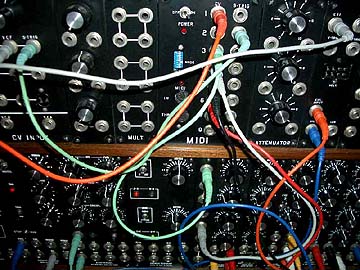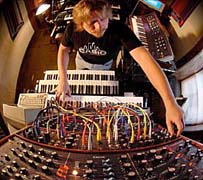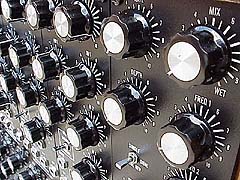 |
The Gatherings Concert Seriespresents aSynthesizer Workshopwith Terry Furber of Orbital DecaySaturday 12 June 2004 8:00pmSt. Mary's Hamilton VillagePhiladelphia, PA |
Terry Furber to Lead Synthesizer Workshop at The Gatherings On Saturday 12 June 2004 at 8:00pm The Gatherings Concert Series will present a Synthesizer Workshop at St. Mary's Hamilton Village. This workshop is open to anyone interested in learning more about the concepts upon which Electronic Music is based. If you have ever been to a concert at The Gatherings series and wondered about how the synthesizer functions and how individuals use this instrument to create music, this workshop is for you!
On Saturday 12 June 2004 at 8:00pm The Gatherings Concert Series will present a Synthesizer Workshop at St. Mary's Hamilton Village. This workshop is open to anyone interested in learning more about the concepts upon which Electronic Music is based. If you have ever been to a concert at The Gatherings series and wondered about how the synthesizer functions and how individuals use this instrument to create music, this workshop is for you!
The workshop at The Gatherings will be headed by veteran synthesist Terry Furber, a leading talent in the field of home synthesizer design as well as in music performance with his Spacemusic duo Orbital Decay (who have performed live on STAR'S END, EMUSIC, Soundscapes, The Gatherings Concert Series and most recently at Gate to Moonbase Alpha on 16 April 2004). Demonstrating on his hand-built MOTM modular synthesizer, Furber will discuss the history, technology, equipment and basic concepts involved in making sounds and producing music. Attendees will have an opportunity to observe close-up the workings of a synthesizer, hear how tones are created, modified and turned into music and learn how these means might be used in their own creative endeavors. Whether you are a beginner, a music fan or have advanced knowledge, you will come away from this workshop with a better understanding of the synthesizer, the people who use them and deeper insight into and better appreciation of the many genres of music inspired by the synthesizer. | |
 Modular Synthesizer Overview
Modular Synthesizer Overview
"The inspiration for modular synths date from the era around the 1970's, when engineers were trying to incorporate the discoveries of the electronic semiconductor revolution into the music field. In order to explore the physics of music, they designed modules that attempted to electronically reproduce the functions of non electronic instruments (acoustic). The original modulars were handmade in very limited numbers and were very expensive. They inspired the creation of best selling keyboard instruments such as the MiniMoog and Sequential Circuits Prophet. Although briefly popular, they faded before the onslaught of cheap off shore digital keyboards. Modulars were rediscovered in the mid 1990s and became prized for their analog sound and radical appearance. The early units soon started to be discovered in garages and university storerooms and began to fetch astounding prices. A few dedicated designers started building modulars again, using modern components and up to date quality standards. Today there is a myriad of available modules..." Notes From http://www.modularsynth.com | |
|
Recommended Workshop Resources:(the following resource links, while not essential, could help provide background knowledge which would enable you to get more out of the synthesizer workshop)
The Gatherings Concert Series hosts the Synthesizer Workshop with Terry Furber on Saturday 12 June 2004 at 8:00pm (doors open at 7:30pm) in the parish hall of St. Mary's Hamilton Village 3916 Locust Walk (just east of 40th & Locust) on the Penn campus in West Philadelphia. Requested Donation: $5 - $10 at the door. All ages welcome. No previous knowledge of music or technology needed.
| |
For more about Terry Furber and Orbital Decay, please access the:
| |
The Gatherings Concert Series is presented by the all-volunteer staff of The Corporation for Innovative Music and Arts of Pennsylvania
| INDEX | ARCHIVES | SCRAPBOOK | NEWS | DIRECTIONS | MISSION | 2004 SEASON |